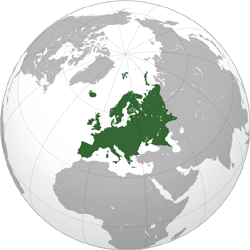 Donald Rumsfeld clung to his failed Iraq strategy for years longer than his boss should have allowed, but Rumsfeld didn’t get everything wrong. He was on to something when he spoke dismissively of “Old Europe.”
Donald Rumsfeld clung to his failed Iraq strategy for years longer than his boss should have allowed, but Rumsfeld didn’t get everything wrong. He was on to something when he spoke dismissively of “Old Europe.”
In today’s Wall Street Journal, Daniel Henninger discusses the mindset that just awarded a Nobel Peace Prize to a freshman president:
The unanswered question at the center of this odd Nobel is whether Barack Obama admires Old Europe for the same reasons it admires him.
When it was a vibrant garden of ideas, Europe gave the world more good things than one can count. Then it discovered the pleasures of the welfare state.
Old Europe now lives in a world of unpayable public pension obligations, weak job creation for its youngest workers, below-replacement birth rates, fat agricultural subsidies for farms dating to the Middle Ages, high taxes to pay for the public high-life, and history’s most crucial proof of decay—the inability to finance one’s armies. Only five of the 28 nations in NATO (the U.K., France, Turkey, Greece and Spain) achieve the minimum defense-spending benchmark of 2% of GDP.
Old Europe has come to resent the world’s only superpower “merely because it possesses the resources to do something Europe can no longer do, for good or ill” — i.e., protect its citizens.
Al Qaeda and its Islamofascistic fellow travelers have unequivocally demonstrated (Madrid 3/11/04, London 7/7/05) that their enemy is not just America, but Western Civilization itself. Now that a basic (if tenuous) level of stability has been achieved in Iraq, the front lines of the war have shifted to the Afghanistan theater.
Our European allies clearly have no stomach for the fight. As America considers sending up to 40,000 additional troops to Afghanistan, even the (relatively) stalwart UK today announced plans to send… um… 500. As in Iraq, it will fall to the United States to achieve any victory (or even stability) in Afghanistan. It remains to be seen whether President Obama has the fortitude to wage a war that Candidate Obama opportunistically (albeit correctly) described as “urgent.”
(Map of tiny Europe from Wikipedia)
Leave a Reply